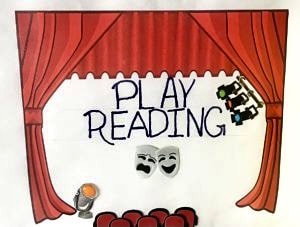South Solihull u3a Play Reading Group - Armchair Theatre
Coordinator: Helen Woodcock
Where: Members' Houses
When: Usually 1st Thursday of each month at 2:00 p.m. See Diary for next meeting
Where: Members' Houses
When: Usually 1st Thursday of each month at 2:00 p.m. See Diary for next meeting
INTRODUCTION
We are a friendly group who read an eclectic mix of plays. Serious, thought provoking, funny and murder mystery scripts have entertained us and improved our play reading skills.
Members choose, and are in charge of, the casting of their plays. We take turns to host in our own homes if that is practicable. We have watched professional productions at the Alex in Birmingham and the Bear Pit Theatre in Stratford upon Avon.
The group meet on the first Thursday of the month at 2:00 pm and we always leave feeling we have had an afternoon well spent. An interlude provides us with tea or coffee and a chat, which is usually about the play.
The idea is that we enjoy being thespians without having to act on stage!!
SEEKING NEW MEMBERS
We have lost a few members over the past year and would welcome new readers. If you are interested please e-mail Helen Woodcock or phone on 01564702259, and she will be pleased and able to tell you more.
FORTHCOMING PLAYS

THURSDAY 8th AUGUST 2024
14:00 - 17:30
Venue: Christine’s house
This is the last play in a trilogy about four friends, Pearl, Jan, Linda and Shelley who have been friends for many years. In the last play the four friends took a trip to Australia. Shelley decided to move there.
This show, Ladies Unleashed, begins some years later.
Pearl, Jan and Linda set off for a long-awaited break on the Holy Island of Lindisfarne. It’s definitely not a hen do, as Linda keeps reminding them a week before her wedding. Linda wants a weekend of quiet contemplation but soon finds her best-laid plans derailed. When a surprise visitor turns up, their retreat becomes a reunion and pretty soon, a riot. They haven’t seen Shelley for years but what’s changed? Quite a lot, they’ll discover. Cut off from the mainland, tensions rise with the tide. But The island is restless too, with echoes of the past in the cold air. As the sky grows dark, the winds of change blow skeletons from closets. Past, present and future collide. As the dawn breaks, will the four friends see themselves in a new light?
The result is wonderfully down to earth, a moving comedy about friendship, growing older and living for today.
14:00 - 17:30
Venue: Christine’s house
This is the last play in a trilogy about four friends, Pearl, Jan, Linda and Shelley who have been friends for many years. In the last play the four friends took a trip to Australia. Shelley decided to move there.
This show, Ladies Unleashed, begins some years later.
Pearl, Jan and Linda set off for a long-awaited break on the Holy Island of Lindisfarne. It’s definitely not a hen do, as Linda keeps reminding them a week before her wedding. Linda wants a weekend of quiet contemplation but soon finds her best-laid plans derailed. When a surprise visitor turns up, their retreat becomes a reunion and pretty soon, a riot. They haven’t seen Shelley for years but what’s changed? Quite a lot, they’ll discover. Cut off from the mainland, tensions rise with the tide. But The island is restless too, with echoes of the past in the cold air. As the sky grows dark, the winds of change blow skeletons from closets. Past, present and future collide. As the dawn breaks, will the four friends see themselves in a new light?
The result is wonderfully down to earth, a moving comedy about friendship, growing older and living for today.

THURSDAY 5th SEPTEMBER
14:00 - 17:30
Venue t.b.c.
Spring and Port Wine by Bill Naughton.
The Crompton family is ruled over by patriarch Rafe, feared by his children, who have to line up and give him a chunk of their wages every week for the locked cashbox he keeps in his desk (which looks more like a sideboard), and his wife, Daisy, who fiddles the figures in the household accounts book he makes her keep to make it balance. Daisy's accounting isn't helped when nosy neighbour Betsy-Jane borrows £5 from her so her TV isn't repossessed and tells her what the neighbours think of her and her domineering husband.
Things come to a head when daughter Hilda decides she doesn't want the herring they traditionally have every Friday teatime, and Rafe puts his foot down, evoking the pre-war hunger marches, telling his wife that she must serve this same herring to Hilda every mealtime until she eats it. But just as stubborn father and daughter are both about to relent, the herring goes missing leading to consequences none of them anticipates.
14:00 - 17:30
Venue t.b.c.
Spring and Port Wine by Bill Naughton.
The Crompton family is ruled over by patriarch Rafe, feared by his children, who have to line up and give him a chunk of their wages every week for the locked cashbox he keeps in his desk (which looks more like a sideboard), and his wife, Daisy, who fiddles the figures in the household accounts book he makes her keep to make it balance. Daisy's accounting isn't helped when nosy neighbour Betsy-Jane borrows £5 from her so her TV isn't repossessed and tells her what the neighbours think of her and her domineering husband.
Things come to a head when daughter Hilda decides she doesn't want the herring they traditionally have every Friday teatime, and Rafe puts his foot down, evoking the pre-war hunger marches, telling his wife that she must serve this same herring to Hilda every mealtime until she eats it. But just as stubborn father and daughter are both about to relent, the herring goes missing leading to consequences none of them anticipates.

THURSDAY 3rd OCTOBER
14:00 - 17:30
Venue t.b.c.
The Crucible by Arthur Miller.
Salem, Massachusetts, 1692. A small group of girls ‘cry out’ against other people in the town, accusing them of witchcraft, in an attempt to cover up their own dabblings in the occult. Led by Abigail Williams, the girls’ accusations cause a court to be formed to investigate the alleged crimes. Caught up in the trials are John and Elizabeth Proctor, a farming couple whose marriage is hanging by a thread. John Proctor, following an illicit affair with Abigail, finds himself and his wife caught up in the proceedings when Abigail accuses Elizabeth of witchcraft, hoping to take her place at John’s side. Desperate to clear his wife’s name, John attempts to convince the court of her innocence, but instead finds himself in deep water when Abigail turns on him. The end of this tale, based on true events, is both tragic and deeply affecting as John is arrested for witchcraft himself. When faced with the choice between confessing to witchcraft, thus saving himself or professing his innocence, and destroying his good name, John finds it is an impossible choice to make…
14:00 - 17:30
Venue t.b.c.
The Crucible by Arthur Miller.
Salem, Massachusetts, 1692. A small group of girls ‘cry out’ against other people in the town, accusing them of witchcraft, in an attempt to cover up their own dabblings in the occult. Led by Abigail Williams, the girls’ accusations cause a court to be formed to investigate the alleged crimes. Caught up in the trials are John and Elizabeth Proctor, a farming couple whose marriage is hanging by a thread. John Proctor, following an illicit affair with Abigail, finds himself and his wife caught up in the proceedings when Abigail accuses Elizabeth of witchcraft, hoping to take her place at John’s side. Desperate to clear his wife’s name, John attempts to convince the court of her innocence, but instead finds himself in deep water when Abigail turns on him. The end of this tale, based on true events, is both tragic and deeply affecting as John is arrested for witchcraft himself. When faced with the choice between confessing to witchcraft, thus saving himself or professing his innocence, and destroying his good name, John finds it is an impossible choice to make…


